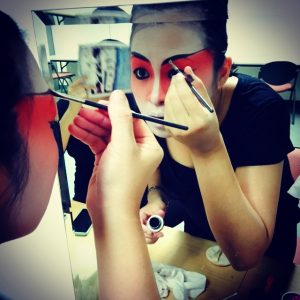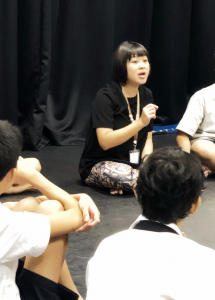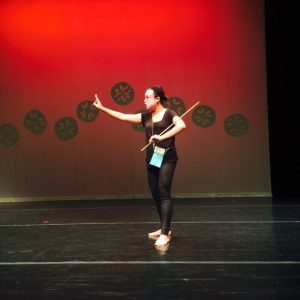SDEA Spotlight: Iris Chia-Khanashat
by SDEA

Graduated from NTU (NIE) with a Bachelor of Arts in Education(first class honours) and awarded Lee Kuan Yew Gold Medal Award, Iris Chia is trained in the visual arts and drama.
1. What are you working on at the moment?
Apart from my regular drama teaching in a main stream secondary school, I am currently working with my drama CCA students on a 45 minutes play for M1 Peer Pleasure Youth Theatre Festival 2018 - 2019 on the theme of Poverty in Singapore. This year I will be conducting a theatre devising workshop at the Esplanade Annex from 25 – 29th July 2018. As for my role as an visual artist, I am currently conceptualising an interactive artwork circling my research on inequality and the relativity of our opinions on needs and wants.
2. What’s the direction of your work? Has it changed over the years?
It has definitely changed, my work used to be circling around my persona and identity in the society. Of recent years it has changed to adopting a macro perspective of studying humanity in general, which entails a lot more reading and research.

3. What is a dream project that you hope to do?
My dream project would be to radicalise and to increase the importance of arts education in Singapore. The importance of dance, drama, music and the visual arts in our mainstream education should not be limited to CCAs or primary school education. It should be viewed as a discipline that is as important as the STEM subjects or language arts.
4. How did you start out doing what you do? I started out as an Industrial Designer after Polytechnic education and was involved in a variety of projects ranging from stage design, makeup design, project management etc. After a part-time stint in ITE as a part time lecturer, I started to realise my calling to teach. Drama and Visual Arts has always been my passion so it is easy to choose what discipline to teach. In NIE, I rediscovered its power to learn about humanity and to impact change. I found Drama deeply resonating to what I do in the visual arts, and love that it is even more accessible to the community at large.
5. How do you keep your work fresh? Loads of reading, talking to people, being a keen observer of things and last but not least, sensitivity to why and how to be human.
6. What do you think makes a perfect drama educator?
There is no perfect drama educator, we are all learners constantly learning from everyone, including our students. I would say perfect can be a dirty word because one can never reach perfection, it can sometimes, impede growth.

7. Why is drama important? Why should it be taught in schools?
Drama is an all-rounded discipline which is inquiry-based and allows students to experiment with options in their daily lives through the act of play. Very seldom we use our bodies to learn in this internet age, so Drama is essential for us to explore what is important in our lives. Narratives through play acting is a powerful tool to help students empathise, express and last but not least to lead a change in status quo for the better of our society.
8. Who was the drama educator that has the most impact on you?
I would say it is the late Christina Sergeant, who taught me Commedia Dell Arte, and also Mr. Han Lao Da (韩劳达), my primary school Drama teacher. Both of whom impacted me in tremendous ways as a drama educator, allowing me to fail, encouraging me to take multiple perspectives.
9. What is your most memorable moment in the classroom?
The most memorable moments I had in the classroom was when students overcome their personal challenges through Drama, the moment where civic literacy becomes alive through drama, and that issues in the society becomes important enough for them raise awareness or to impact change.

10. Share a drama activity that you love to do.
I love to have students play the Columbian Hypnosis and the push and pull game from Augusto Boal. I am a big fan of the games from the theatre of the oppressed because they not only teach students about theatre and their role as a theatre maker, they also connect to the complexity of human relationships and systemic oppression we experience as an individual.
11. What do you hope to see in Singapore's drama/theatre landscape in future?
I certainly hope that there will be more opportunities to experience drama in mainstream education and less of being an elective. With that, the infrastructure to support guerrilla production companies must be encouraged. More small performance venues should be available to keep production costs low and to allow a longer season.
12. In one word, sum up your drama education journey.
Adventure



